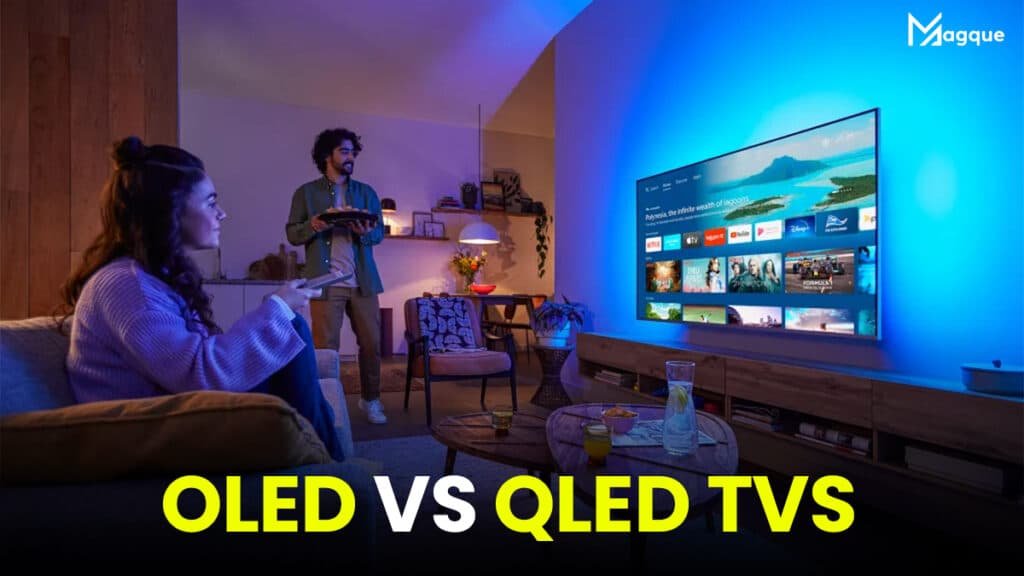Hey there, fellow tech enthusiasts! Are you on the hunt for a new TV but feeling overwhelmed by all the jargon and options? Don’t worry; you’re not alone. One of your most significant decisions when shopping for a new television is whether to go for OLED or QLED. Let’s dive into the nitty-gritty and unravel the mysteries behind these two cutting-edge display technologies.
Understanding OLED
First, talk about OLED, which stands for Organic Light-Emitting Diode. OLED TVs are renowned for their stunning picture quality and vibrant colors. The magic lies in each pixel’s ability to emit light, resulting in true blacks and infinite contrast ratios. Imagine watching a movie with deep, rich blacks that make the colors pop like never before. That’s the OLED experience in a nutshell.
Exploring QLED
We have QLED, or Quantum Dot LED, on the other side of the ring. QLED TVs boast brighter displays and excellent color accuracy, thanks to quantum dots that enhance the backlighting. These TVs are perfect for well-lit rooms or spaces where glare might be an issue. With QLED, you can expect vivid colors and impressive brightness levels that bring your favorite content to life.
The Battle of Picture Quality
Regarding picture quality, both OLED and QLED have their strengths. OLED produces true blacks and infinite contrast, making it ideal for dark room viewing and cinematic experiences. Conversely, QLED shines in brightly lit environments and offers stunning colors that pop off the screen. It ultimately boils down to your viewing preferences and the environment in which you’ll watch TV most.
Features and Functionality
Beyond picture quality, there are other factors to consider when choosing between OLED and QLED. Thanks to their self-emissive technology, OLED TVs tend to be thinner and more flexible. Meanwhile, QLED TVs often come packed with intelligent features, such as voice control and AI enhancements, making them an excellent choice for tech-savvy consumers.
Making Your Decision
So, which TV technology is right for you? It depends on your priorities and viewing habits. OLED might be the way to go if you crave unparalleled picture quality and don’t mind paying a premium. On the other hand, if you prioritize brightness and versatility, QLED could be the perfect fit for your needs.
Conclusion
There’s no clear winner in the battle of OLED vs QLED TVs. Each technology has pros and cons, catering to different preferences and viewing environments. Whether you’re a cinephile seeking the ultimate home theater experience or a casual viewer looking for a versatile TV for everyday use, weigh your options carefully and choose the technology that best suits your needs.
So, what’s your pick: OLED or QLED? Let us know in the comments below!
At Magque, we’re dedicated to helping you make informed decisions about the latest tech trends. Stay tuned for more insightful content to elevate your digital lifestyle.
(FAQs)
Q1. What is the main difference between OLED and QLED TVs?
The main difference lies in the underlying technology. OLED TVs use self-emitting pixels that produce light, resulting in true blacks and infinite contrast ratios. On the other hand, QLED TVs utilize quantum dots to enhance backlighting, offering brighter displays and excellent color accuracy.
Q2. Which TV technology is better for gaming: OLED or QLED?
OLED and QLED TVs can deliver exceptional gaming experiences but have different strengths. OLED TVs excel in displaying fast-moving scenes with minimal motion blur, making them ideal for immersive gaming. QLED TVs, with their brighter displays, are better suited for well-lit gaming environments where glare might be an issue.
Q3. Are OLED TVs more prone to burn-in than QLED TVs?
Burn-in, or image retention, concerns OLED TVs, especially with static images or logos displayed for extended periods. QLED TVs, with their different technology, are less susceptible to burn-in. However, advancements in OLED technology, such as pixel-shifting and screen savers, have significantly reduced the risk of burn-in.
Q4. Which TV technology is more energy-efficient: OLED or QLED?
OLED TVs are more energy-efficient than QLED TVs, primarily because they do not require backlighting. Since OLED pixels emit their light, they can achieve deeper blacks and consume less power, especially when displaying dark content. QLED TVs, with their backlighting, may consume more energy, particularly at higher brightness levels.
Q5. Do OLED or QLED TVs have better viewing angles?
OLED TVs typically offer better viewing angles than QLED TVs. With OLED’s self-emissive technology, each pixel emits its light, resulting in consistent colors and contrast even when viewed from the side. In contrast, QLED TVs may experience some color and contrast degradation when viewed off-center, although advancements in panel technology have improved viewing angles for both types of TVs.
Read Also This:- The Latest in OLED vs QLED Technology
